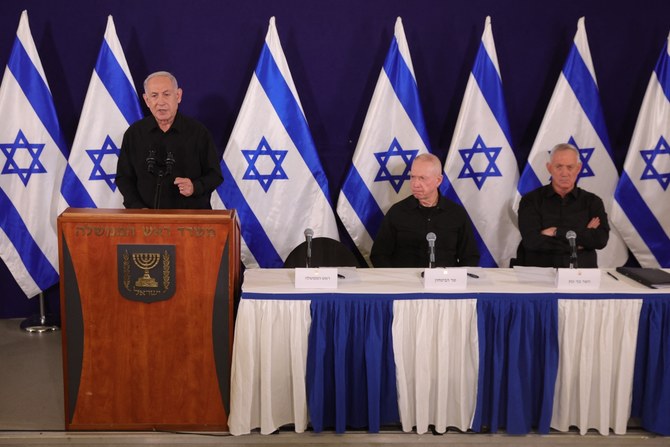
The horizon appears cloudy for the rival Palestinian Fatah and Hamas movements. After long decades of trying everything, from revolution to armed resistance to negotiations, the result on the ground has been a major catastrophe: Division verging on separation.
It is no secret that after hundreds of armed operations and hundreds of hours of negotiations, the Palestinians have found themselves at a dead-end. The Israeli-occupied West Bank is enjoying semi-autonomous rule, Gaza is under a tight siege and Jerusalem is under Israeli occupation. On top of everything, the Palestinian Authority’s option to hold negotiations appears to have failed as did Hamas’ option to adopt armed resistance and maintain rule over Gaza.
Many leaders from Fatah and Hamas have implicitly acknowledged that they are at a dead-end, otherwise Palestinian President Mahmoud Abbas would not have announced that he will not return to the negotiations table based on the old mechanism. He also said that he will not commit the same mistakes. Hamas, for its part, opted to alter its charter and adopt popular resistance as its new path, while negotiations are seen as a last resort.Fatah’s crisis and options
Fatah’s major crisis is that it did not yield a state for the Palestinian people despite years of resistance and negotiations. More accurately, it did not succeed in transferring power from the PA to the state. Moreover, rounds of negotiations with successive Israeli governments and a completely Israel-biased American mediator have left it with nothing.
Abbas set a new plan, based on negotiations, to get rid of negotiations. The plan will be a departure from old mechanisms and will rely on an international peace conference, which the president had called for. The conference is expected to produce an international mechanism similar to the one adopted during negotiations over Iran’s nuclear program in 2015.
Abbas wants his plan to serve as a response to US President Donald Trump’s decision in December to recognize Jerusalem as the capital of Israel. This decision destroyed any possibility for the implementation of the two-state solution in which the Palestinians see Jerusalem as the capital of their future state. Abbas also escalated his rhetoric by threatening to suspend the recognition of Israel, cancel treaties and announce the establishment of a Palestinian state.
Palestinian columnist Hani al-Masri dismissed these steps as an attempt by Abbas to buy some time, send a message of goodwill after the negotiations option collapsed and block the possibility of the eruption of an armed confrontation.
The predicament at the moment is that all options and policies that have been adopted for over a quarter of a century have only led to the deterioration of the situation on the ground. This deterioration accelerated with Trump’s election as president, added Masri.
The main predicament does not lie in the political process and international resolutions – none of which have been implemented – but in the absence of an Israeli partner that accepts the settlement, even if it falls in its favor, he noted.
Israel wants everything and only wants to give a semblance of autonomous rule to the Palestinians, but under Israeli sovereignty, he continued.
The solution lies in radically changing the rules of the game that have been adopted since the signing of the Oslo Accords. A new approach must give priority to restoring Palestinian unity and adopting resistance as a comprehensive way to achieve goals and building institutions through national consensus, said Masri.
The representation of various factions must be ensured based on a comprehensive national and strategic vision that aims to alter the balance of power and not force one to succumb to the other, he explained.Is the unity option possible?
Just a few days ago, Abbas announced that he wanted the PA to impose its complete control over the Hamas-ruled Gaza Strip. The movement rejects this proposal and is insisting that Abbas lift the harsh measures he had adopted against the coastal enclave. This could then be followed with the formation of a national unity government and, later, the revival of the Palestinian Liberation Organization based on complete partnership.
In a nutshell, Fatah and Hamas are divided over central issues: a unity government, sanctions, fate of Hamas military employees, the PLO, security agencies, financial and judicial affairs, and territories. When combined, these issues reflect a much larger dispute: who rules the Palestinian territories.
Everyone is demanding that reconciliation be made, that the so-called “deal of the century” be rejected and that an international peace conference be held. They have also rejected temporary solutions. All these are justified demands, but their application on the ground appears to be unlikely any time soon as the rival factions continue to fight over power.Hamas’ crisis and options
Hamas’ main crisis is its coup against Abbas. Eleven years after capturing the Gaza Strip, the movement fought three destructive wars against Israel and its rule has left the enclave in mounting poverty. The movement has found no other option but to escape, either by heading to war or reaching reconciliation or striking a deal with Israel.
The movement has always counted on popular resistance. It resorted to this option when it failed in ending the Gaza siege. It sought, through the blood shed on Gaza’s borders, to draw attention and it succeeded in doing so, but a truce does not seem within reach.
Hamas is now seeking calm that would allow it to hold talks over a prisoner exchange with Israel and later establish major projects in Gaza.
Hamas’ plans, however, are confronted by Abbas’ total rejection of these talks, which he deems as an attempt to completely separate Gaza from the West Bank. Many Palestinian officials have already accused the movement of seeking to destroy the Palestinian cause and accept the “deal of the century.”
Fatah and PLO executive committee member Azzam al-Ahmed rejected any deal between Hamas and Israel as “treason against the Palestinian people and their national cause.” Palestinian Prime Minister Rami al-Hamdallah warned Hamas against holding a truce with Israel, saying it could pave the way to implementing the “deal of the century.”
Hamas politburo chief Ismail Hanieh, meanwhile, vowed that the movement will continue with truce talks.
It remains to be seen whether Hamas could actually reach a truce without Abbas’ consent. The Palestinian president could resort to cutting off all funds from Gaza and transform the truce into a new nightmare.
It seems that none of the Palestinians are looking at the bigger picture or the long-term future.
Columnist Mustafa Ibrahim noted: “So far, we have not been presented with a clear Palestinian vision. Gaza is preoccupied with border marches and Abbas has not submitted a national strategy to confront the ‘deal of the century.’”
Moreover, none of the slogans of Palestinian resistance have yielded any results and no one has presented a real stance to confront the Israeli nation-state law, which effectively ended the two-state solution, he added.
“We repeat the same experiences without learning from them,” he lamented.












